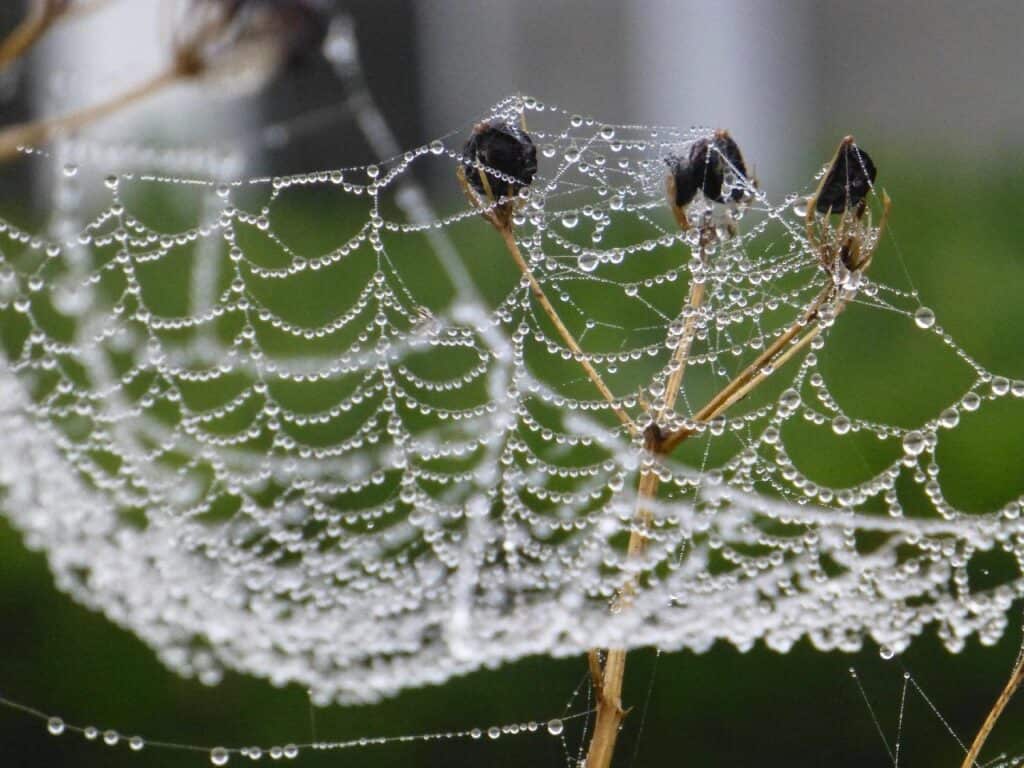Spiders are our friends, for the most part, they capture and eat the kind of bugs that most of us would prefer not to have around. From cockroaches to mosquitoes, they all make a tasty snack for spiders and the most common way for the spider to catch their prey is to build a web. But should you leave those webs untouched in your home or are they a secret fire hazard?
Spider webs can catch fire, but they are not particularly flammable in the typical sense. The web usually will kinda smolder or “melt”, but not sustain a flame. The more web that is present at any given point, the better that it will burn as a general rule.
Lets look more into spider webs and how they are from a fire safety standpoint.
Your # 1 priority is keeping your family safe. As a firefighter, I recommend everyone has updated smoke detectors that don’t require battery changes, like these ones from Kidde, a fire extinguisher, like this one from Amerex, and a fire escape ladder if you have bedrooms above the first floor, I recommend this one from Hausse.
Also read: What Makes Something Flammable?
What Are Spider Webs Made Of?

A spider’s web is made of spider silk. That’s a natural fiber and it’s made, oddly, of proteins that the spider creates from the food that it eats.
If this sounds unusual, it’s not. Human beings don’t spin their own silk (sadly, as that would be a neat party trick, wouldn’t it?) but they do grow hair and nails. Both of these things are made out of keratin, which is a protein our bodies create just for that very purpose.
A spider has a silk gland (and so do some insects – like the silkworm) and they “spin” (metaphorically speaking – there’s no mini-silk loom inside a spider) their silk in the gland and then they use their legs to pull it out and shape it.
Some species of spider have many different silk glands.
Each gland can produce a slightly different quality of silk and some silks are stronger or stretchier than others or thicker or thinner. This allows them to be used for different purposes (such as strands of a web, sticky strands that just dangle in the air, and for egg coverings or for wrapping up their prey).
Millions of years of spider evolution has ensured that modern day spiders make a very strong form of silk, indeed. This is biologically advantageous because it allows the spider to be certain of catching its prey with the minimal amount of effort.
In fact, spider silk is so strong that the strongest form of spider silk (such as that made by a golden orb spider) can be stronger than steel.
In a fairly revolting development, genetic engineering has been used to enable scientists to produce their own spider silk without any spiders. They bio-engineered a goat to produce spider silk from its mammary glands.
Yes, we think that’s the creepiest thing that modern science has done so far in the 21st century.
Also read: Are Mothballs Flammable or Combustible?
Are They Flammable?
Yes, spider webs are flammable. Spiders don’t tend to encounter very much fire in the real world and thus, while their webs are very strong – they’re only strong when it comes to catching and imprisoning their prey.
Their webs weren’t made to resist fire and thanks to the very fine threads, not only do they not resist fire, but a flame of just 10-20 degrees above room temperature can cause a cobweb to quickly disappear (but with little to no flame).
If you were planning on using fire to get rid of cobwebs, I would advise against it. The webs could potentially spread the heat and catch something on fire that you hadn’t intended.
Here is a demo:
Also read: Does Smoke And Fire Repel Mosquitoes?
What About Spider Silk?
It pretty much follows that if a spider’s web is flammable that spider’s silk will be flammable too and this is correct.
You’re unlikely to encounter any spider’s silk in your day-to-day life that isn’t, in fact, part of a spider’s web mind you. There is a biological cost to producing spider’s silk and as with almost all biological processes, it’s best for the spider to avoid any kind of inefficiency as if they expend too much silk without catching any food, they will die because of the energetic losses.
Are Cobwebs A Fire Hazard?
So, does that mean that cobwebs are a fire hazard? Well, we guess it depends on just how many cobwebs you’re talking about.
A single tiny cobweb in the corner of your bedroom ceiling is not a fire hazard. While it might ignite easily, the burning temperature is low and there’s not enough web there to pass on any flames to any other part of your room.
However, if we’re talking haunted house with millions of cobwebs everywhere, then it is possible that setting fire to them could cause a bigger fire. We’d note though that we can’t find a single recorded incidence of this actually happening.
What About Spiders?
This is a cruel question really. We know that spiders are often considered a bit repulsive and we’re not exactly arachnophiles ourselves but at the same time, it’s wrong to set fire to any kind of creature.
It’s also not a very useful thing to do because to answer the question, no, spiders are not flammable as, like all living creatures, they are made up of a large percentage of water and water is not at all flammable. Now, if you dried out a spider, it would probably burn but please, don’t try this at home.
Related Articles
Is Polyester Flammable? Is it Fire Resistant?

